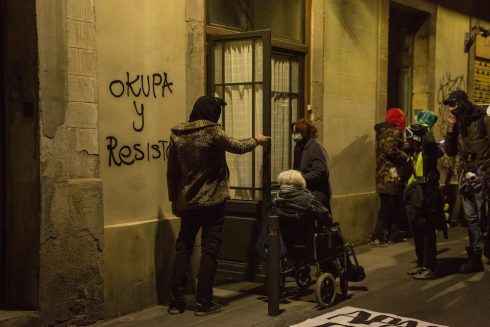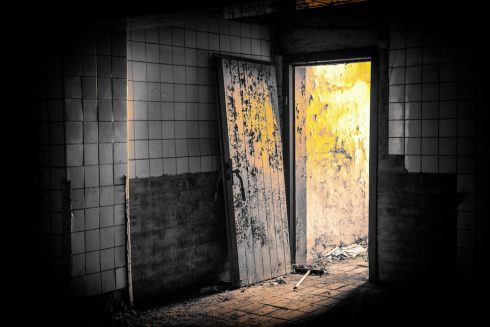CONTRARY to popular belief there are no laws in Spain that grant squatters the right to illegally occupy a house.
But that doesn’t mean Spain effectively manages its problems with okupas.
In fact, every year the issue of squatters is getting worse.
Criminal complaints against squatters grew 40% between 2015 and 2020 – a year in which authorities received 14,675 complaints.
Figures from January to September 2021 already show 13,389 denuncias to police.
That’s 49 houses squatted somewhere in Spain every single day.
It’s no surprise a recent poll found that 80% of landlords are worried about squatters occupying their rental homes and apartments.
Another online poll found that 76% of Barcelona residents were more afraid of squatters than burglars, while a massive 94% felt defenceless against the squatters occupying their homes.
According to Spanish Property Insight, homeowners in Spain are at much ‘higher risk’ of squatter-related problems than anywhere else in Europe.
The problem is worsened by the inability of local police to act, lengthy court cases when they do, high costs involved and the possibility of going to jail yourself for making a wrong move.
Here are three key laws that explain both your rights and squatters’ rights in Spain.

1. Allanamiento de morada
First, let’s look at the Spanish Constitution.
According to Article 18.2 the ‘home is inviolable’ and no one may enter except with a court order or in the case of ‘flagrant crime’.
Though someone’s unwanted presence in your own house would appear a flagrant crime, it’s not always so in Spanish law.
For a squatter to commit such an offence they would need to break into your primary or secondary home.
In Spain, this is a crime known as an Allanamiento de Morada.
According to articles 202.1 and 202.2 of Spain’s penal code, prison sentences range between 6 months to 2 years.
If violence is involved, the jail sentence rises to 4 years with extra fines.
A phone call to police within 48 hours of any break-in and means to prove the home is your primary residence should suffice to kick the squatters out.
But the issue is the majority of squatters know this and do not target primary residences.
According to lawyer Felipe Condes: “Squatters always look for homes that aren’t the morada [primary dwelling] of the homeowner.”
Instead, squatters in Spain look for apartments or homes owned by a bank, homes that are up for auction or uninhabited homes unlikely to be a primary or secondary residence.
If a squatter can slip in long enough to change the locks of a rarely-used vacation home, it’s difficult for the police to act swiftly.
According to Condes, a squatter ordering a pizza to the address has been known throw off the police or a judge.
Why?
It’s not because of any particular squatters’ right in Spain, but because they fool authorities into thinking the property is the squatters’ morada – or primary dwelling.
Remember, this is somebody who has broken into your home, they don’t mind lying.
The same Article 18.2 of the Spanish Constitution therefore comes into play: if you smash down a door with the locks changed, you could be charged with a crime of Allanamiento de Morada.
Sure, it might be your newly-bought home or vacation property on paper, but in real life only you or the squatter can live in it full-time.
Until you manage to kick them out, it’s not worth giving the squatter a chance to complicate the process.

2. Delito de coacción
If a squatter has broken into a house that’s not your primary residence, prepare to wait months to kick them out.
This is, of course, unfair.
You may have paid hard-earned cash or gained a property in inheritance.
But you need to know these property rights to take the best course of action and avoid breaking the law yourself.
Firstly, do not attempt to enter the house as you’ll be committing a crime of Allanamiento de Morada.
Secondly, do not cut supplies or attempt to change the locks.
If you do, you’ll be committing a crime of coacción (coercion) which carries a jail sentence between 6 months and 3 years depending on the ‘seriousness’ of the crime.
Article 172.1 of Spain’s penal code says a delito de coacciones is anything that ‘impedes another from doing what the law does not prohibit or compels another to do what they do not what, be that just or an injustice’.
In short: Spanish citizens have an inalienable right to enjoy their primary home.
Cutting off supplies or changing the locks affects that right, and a squatter could say anything to the police or judge to lie about why they’re in the house.
And lie they will.
As expert in buying and selling homes for renovation Tristan el Subastero says: “Until you’re actually inside the home, its the squatter who has the upper hand. This makes it stupid to argue with them, raise your voice or threaten them in any other way.”
“It’s also less likely they will destroy the house if you negotiate calmly.”

3. Delito de usurpacion
If the squatter is in a home that’s your primary or secondary residence, you’ll most likely be dealing with Article 245 of Spain’s penal code, a Delito de Usurpacion.
It’s harder to get the police to act because, as the house is not your primary residence, your rights are not defended by the Spanish Constitution.
Unless the property is a business, it will be impossible to evict squatters without a court order.
The court case could take 5 months and it’s worth noting the squatter will most likely receive a fine of around €300 for between 3-6 months as a sentence.
Yes, that’s a minimum of just €900.
A Delito de Usurpacion will only see jail time if violence is involved, so a squatter doesn’t have a lot to lose.
In either case a judge will name an eviction date, though a squatter can appeal this decision dragging the procedure out to at least 10 months.
It’s important to remember the above are crimes processed through a criminal court in Spain.
Oftentimes, a civil lawsuit can be far quicker than going through the criminal justice system, and if you start both a criminal and civil case the criminal case will take precedence.

The civil route to evicting squatters in Spain
In 2018 Spain passed laws to speed up the eviction process through civil cases – this is known as Desahucio Expres or ‘express eviction’.
Once the case is presented to your nearest Juzgado (you’ll need to contract the services of a lawyer) the squatter has 5 days to prove legal ownership of the house.
According to Conceptos Juridicos, the whole court process can take 4-6 months.
According to Marin y Mateo Abogados, the civil law process for evicting squatters from a business property can take up to 8 months.
The good news is that once a judge has ordered an eviction date there is no route for squatters to appeal.
Furthermore, with a court order, the police can take charge of the eviction.
Get an alarm
Prevention is the best form of defence in the case of squatters in Spain.
Many alarm companies will call the police for you and so – even if the house is not your primary residence – speed up the eviction.
You can also install your own camera system to catch break-ins and begin the eviction process as soon as possible.
If the house is not your primary residence, you need to act as quick as you can before the case goes to courts.
According to Spanish Property Insight, the most expensive alarm system can cost between €1000-€3000 installation plus €300 or more in subscription fees.
Other larger companies with a standard package might charge €500 installation and a monthly fee between €30-€50.
These are costly investments, but if the house is not your primary or secondary home you may end up paying far more in legal fees or negotiations to kick a squatter out.

The vigilante route to evicting squatters in Spain
Many businesses have sprung up across Spain to speed up the process of evicting squatters.
These businesses have both lawyers and personnel (usually gymgoers with martial arts training) to negotiate a squatters’ exit from your property without breaking the law.
Many times they can get the job done in 24 hours.
Typically, they may wait for a squatter to exit and then block re-entry, or they will have the squatter sign a contract that agrees the terms of their exit.
Typically, this requires both a single payment to the squatter and service costs to the eviction company.
The full cost of using Spain’s most famous anti-squatter company – Desokupa – can be between €4,500-€8,500.
Striking your own deal with squatters
It’s not uncommon knowledge that mafias break into unoccupied houses purely to extort the owners for money.
They know how to manipulate laws to remain in the residence for months while you drain funds on legal fees or other measures.
Sometimes, agreeing to pay the squatter a fee can be the quickest way to get them out.
It encourages racketeering, but sometimes there’s no other solution.
According to Tristan el Subastero, he haggled down from €12,000 to agree to a one-time fee of €1,200 to remove a squatter from a house he’d bought in auction.
Tristan however then falsified a legal letter threatening immediate removal of the squatter’s child if she did not leave.
She bolted and he ended up not paying a cent.
(Any creativity on your part is at your own risk.)
The problems of squatters in Spain and the lack of quick solutions is frustrating.
But that’s why it pays significantly in many cases to know the laws to react quickly and effectively.
Many squatters will have read the widespread squatters’ manuals available online and know how much money you’re going to spend on kicking them out.
It’s unfair.
It should be illegal.
But until the law changes it’s your only hope to recover what is rightfully yours.
READ MORE:
- Squatters evicted under new four-week ‘quickie’ process in Costa Blanca town in Spain
- EXCLUSIVE Horrifying video shows destruction of British couple’s home ‘set alight by squatters’
- Property owner returns home to find three squatters on his sofa in Spain’s Costa Blanca
- Homeowners of luxury Marbella villa turn to professional eviction company to get rid of squatters
- Community of owners force speedy squatters’ eviction setting a ‘legal trend’ on Spain’s Costa Blanc
- Angry neighbours force squatters out of two houses ‘within hours’ following street protest
Click here to read more News from The Olive Press.








